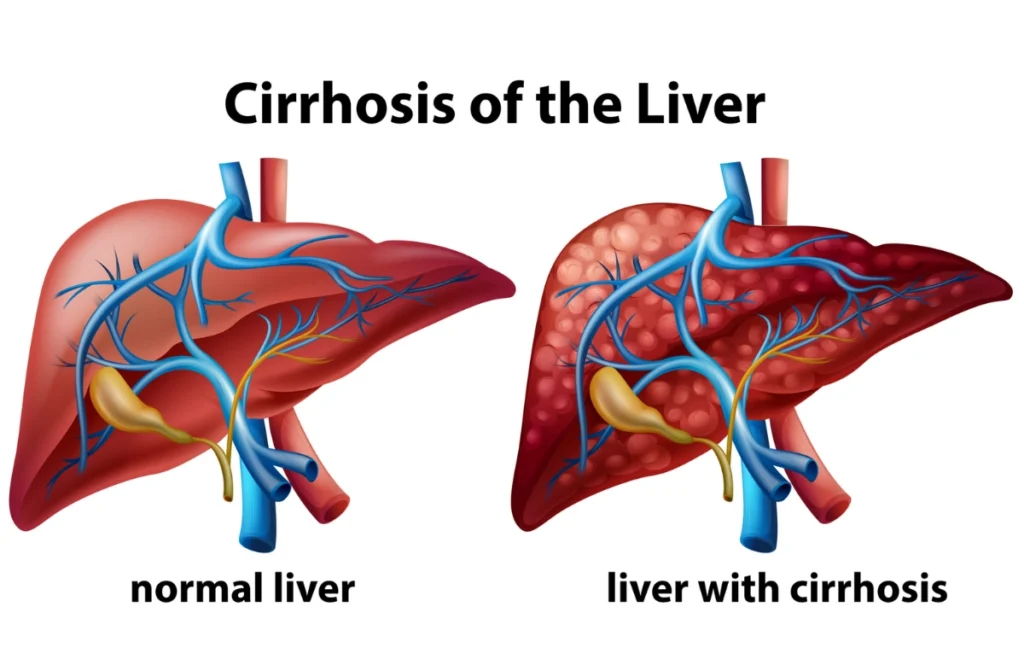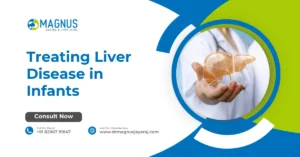The liver, a vital organ responsible for various metabolic functions, can face serious health issues, and one such condition is liver cirrhosis. This blog post aims to shed light on the causes, symptoms, diagnosis and, most importantly, the treatment options for liver cirrhosis. If you or someone you know is seeking liver cirrhosis treatment in Chennai, read on to gain valuable insights into this condition.
What is Liver Cirrhosis?
Liver cirrhosis is a progressive and irreversible scarring of the liver tissue, often resulting from long-term liver damage. This scarring hinders the liver’s normal functioning, leading to complications over time. Common causes include chronic alcoholism, viral hepatitis, and non-alcoholic fatty liver disease. Understanding the underlying causes is crucial in devising an effective treatment plan.
Causes of Liver Cirrhosis
Liver cirrhosis can result from various underlying conditions that damage the liver over time. Common causes include:
- Chronic alcohol consumption.
- Viral hepatitis (hepatitis B and C).
- Non-alcoholic fatty liver disease (NAFLD).
- Autoimmune hepatitis.
- Genetic disorders such as hemochromatosis or Wilson’s disease.
- Prolonged bile duct obstruction.
Consulting the best cirrhosis treatment doctors in Chennai can help diagnose and treat these causes effectively.

Symptoms of Liver Cirrhosis
Liver cirrhosis symptoms often manifest as the disease progresses, including:
- Fatigue and weakness.
- Unexplained weight loss.
- Jaundice (yellowing of the skin and eyes).
- Swelling in the legs, ankles, or abdomen.
- Spider-like blood vessels on the skin.
- Easy bruising or bleeding.
- Confusion or difficulty concentrating due to toxin buildup.
Recognizing these symptoms early can significantly reduce the liver cirrhosis treatment cost in Chennai by enabling timely interventions.
Best Cirrhosis Treatment Doctors in Chennai
Dr. Magnus Jayaraj
Experience: 17+ Years
Qualification: MBBS (JIPMER), MS (JIPMER), MNAMS (GI Surgery), MRCS (Edin.), FACS, GCSRT (Harvard)
Dr. Magnus Jayaraj is a trusted expert in liver and biliary care, especially known for his skilled approach in managing liver cirrhosis. With decades of experience in hepatobiliary surgery and liver transplantation, he offers personalized treatment plans tailored to each patient’s condition and lifestyle.
Strong Expertise in Cirrhosis Management
- Trained in advanced HPB and transplant surgery, he handles complex cirrhosis cases involving complications like ascites and portal hypertension.
- He focuses on both medical and surgical solutions depending on disease severity, helping patients maintain liver function longer.
Tailored and Ongoing Patient Care
- Dr. Magnus closely monitors liver function, symptoms, and nutrition to slow disease progression.
- His treatment approach emphasizes patient comfort, lifestyle changes, and long-term stability.
Well-Versed in Transplant-Ready Cases
- For advanced cirrhosis, he guides patients through transplant readiness, surgery, and recovery.
- His calm, clear communication and outcomes-based care make him a preferred choice for liver patients.

Stages of Liver Cirrhosis
Liver cirrhosis develops in four stages:
- Compensated cirrhosis: Minimal symptoms, liver functions normally.
- Decompensated cirrhosis: Symptoms appear; complications like ascites or jaundice may develop.
- Advanced cirrhosis: Severe symptoms with irreversible liver damage.
- End-stage liver disease: Requires a liver transplant to survive.
Treatment costs vary depending on the stage. Consulting the liver disease treatment doctors in chennai ensures stage-appropriate care.
Complications of Liver Cirrhosis
- Portal Hypertension and Varices: Cirrhosis often causes increased pressure in the portal vein, leading to swollen veins in the esophagus and stomach. These veins can rupture, causing life-threatening bleeding if untreated.
- Ascites (Fluid Build-Up): A common complication where excess fluid collects in the abdominal cavity. It can cause discomfort, difficulty breathing, and increase the risk of bacterial infections such as spontaneous bacterial peritonitis.
- Hepatic Encephalopathy: Due to the liver’s inability to clear toxins from the blood, patients may experience confusion, memory issues, and even coma. This condition significantly impacts quality of life and requires prompt treatment.
- Liver Cancer (Hepatocellular Carcinoma): Cirrhosis increases the risk of developing primary liver cancer. Regular monitoring with imaging and blood tests is essential to detect it early.
- Kidney Dysfunction: Severe cirrhosis can affect kidney function, leading to a condition known as hepatorenal syndrome, which worsens prognosis without immediate medical intervention.
How to Diagnose Liver Cirrhosis
- Physical Examination and History: Doctors assess symptoms such as jaundice, swelling, and fatigue while reviewing alcohol use, viral hepatitis history, or genetic conditions.
- Blood Tests: Liver function tests, clotting studies, and markers like albumin levels provide insights into the severity of liver damage.
- Imaging Techniques: Ultrasound, CT scans, and MRI can reveal liver scarring, nodules, and fluid accumulation. FibroScan, a non-invasive technique, is often used to measure liver stiffness.
- Liver Biopsy: In selected cases, a biopsy may be performed to confirm cirrhosis and determine the extent of liver damage.
How Liver Cirrhosis is Treated
- Lifestyle and Dietary Modifications: Patients are advised to avoid alcohol completely, follow a balanced diet, and reduce salt intake to manage fluid retention.
- Medications: Depending on the cause, antiviral drugs for hepatitis, diuretics for ascites, and lactulose for encephalopathy may be prescribed. These aim to slow progression and control complications.
- Endoscopic and Surgical Procedures: To treat bleeding varices, endoscopic band ligation or shunt surgeries may be recommended. In severe cases, liver transplantation remains the only curative option.
- Ongoing Monitoring: Patients require continuous follow-up with the best doctor for liver cirrhosis in Chennai to prevent complications and detect liver cancer early.
How Can Liver Cirrhosis Be Avoided?
- Preventing Viral Hepatitis: Vaccination for hepatitis B and safe practices to avoid hepatitis C transmission play a vital role. Regular screening for those at risk ensures early intervention.
- Limiting Alcohol Intake: Avoiding excessive alcohol consumption or quitting altogether significantly reduces the risk of cirrhosis development. Alcohol-related liver disease remains one of the most preventable causes.
- Maintaining a Healthy Lifestyle: A balanced diet, exercise, and managing conditions like diabetes and obesity help prevent fatty liver disease, which can progress to cirrhosis.
- Regular Health Checkups: Early consultation with the best cirrhosis treatment doctors in Chennai can help detect liver issues before they progress to severe stages.
Prevention of Liver Cirrhosis
Preventing cirrhosis is key to avoiding serious complications. Follow these steps:
- Limit Alcohol Consumption – Excessive drinking can damage liver cells.
- Maintain a Healthy Diet – Nutritious food supports liver health.
- Regular Medical Check-ups – Early detection ensures the best liver treatment in Chennai.
- Manage Viral Hepatitis – Timely treatment prevents further liver damage.
For effective liver cirrhosis treatment in Chennai, consult liver disease treatment doctors in Chennai who offer personalized care and advanced medical solutions. Choosing the right specialists ensures the best approach to liver cirrhosis treatment in Chennai and better liver health.
How Much Does Liver Cirrhosis Treatment Cost in Chennai?
- Hospitalization and Medical Management: The cost of liver cirrhosis treatment in Chennai depends on the severity of the condition. Medications, endoscopic procedures, and regular checkups typically range from moderate to high expenses.
- Advanced Procedures and Transplants: If cirrhosis progresses, procedures like TIPS (Transjugular Intrahepatic Portosystemic Shunt) or liver transplantation are considered. The liver cirrhosis treatment cost in Chennai for transplants can vary widely depending on hospital facilities and donor availability.
- Doctor Consultation and Follow-Up: Regular visits to the best doctor for liver cirrhosis in Chennai are necessary for monitoring. Choosing the best liver cirrhosis treatment in Chennai ensures comprehensive care and increases survival chances.
- Insurance and Financial Planning: Many hospitals offering the best liver cirrhosis treatment in Chennai provide financial guidance and insurance support to ease the burden. Consulting the best cirrhosis treatment doctors in Chennai helps patients understand long-term costs and outcomes effectively.
Conclusion
Understanding the best liver treatment in Chennai is vital for individuals seeking assistance, especially in a city like Chennai, where healthcare facilities are advanced. Whether you’re contemplating lifestyle changes, exploring medication options, or considering a liver transplant, consulting with a healthcare professional is the first step towards managing this condition effectively. If you or a loved one is dealing with liver cirrhosis treatment in Chennai, it’s crucial to access specialized care.
Read also How to Stop Liver Pain Immediately.




